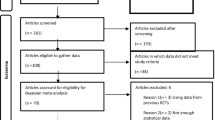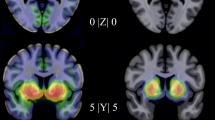Abstract
Objectives
To determine whether variation in the serotonin transporter gene promoter (5HTTLPR) influences the efficacy of selective serotonin reuptake inhibitors (SSRIs) in generalized social anxiety disorder (GSAD).
Methods
Consecutive series of N=32 patients with DSM-IV GSAD for whom DNA and standardized outcome data from a 12-week SSRI trial were available. After ensuring that neither clinical response [clinical global impression of change scale (CGI-C)] nor 5HTTLPR genotype was confounded by ethnicity or sex, we determined whether the number of copies (0, 1, or 2) of hi-risk alleles using either the diallelic L–S system or the triallelic La–Lg–S system, predicted response and change in Liebowitz social anxiety scale (LSAS) and brief social phobia scale (BSPS) scores during SSRI treatment.
Results
Twenty-one patients (66%) were responders to SSRI (i.e., CGI-C much or very much improved). A trend was seen for a linear association between 5HTTLPR genotype and likelihood of response to SSRI: diallelic classification L/L 7/8 (88%), L/S 12/18 (67%), S/S 2/6 (33%), p=0.051; triallelic classification L′/L′ 4/5 (80%), L′/S′ 14/19 (74%), S′/S′ 3/8 (38%), p=0.093. Reduction in LSAS (and BSPS) scores during SSRI treatment was significantly (p<0.02) associated with 5HTTLPR genotype using either the diallelic or triallelic classification.
Conclusions
Variation in a functional polymorphism known to influence serotonin reuptake is associated with SSRI response in patients with GSAD. Independent replication in larger samples is required before the predictive utility of this information can be confirmed and generalized to clinical settings.


Similar content being viewed by others
References
Argyropoulos SV, Hood SD, Adrover M, Bell CJ, Rich AS, Nash JR, Rich NC, Witchel HJ, Nutt DJ (2004) Tryptophan depletion reverses the therapeutic effect of selective serotonin reuptake inhibitors in social anxiety disorder. Biol Psychiatry 56:503–509
Bauman MD, Amaral DG (2005) The distribution of serotonergic fibers in the macaque monkey amygdala: an immunohistochemical study using antisera to 5-hydroxytryptamine. Neuroscience 136:193–203
Charney DS (2004) Discovering the neural basis of human social anxiety: a diagnostic and therapeutic imperative. Am J Psychiatry 161:1–2
Davidson JRT, Miner CM, DeVeaugh-Geiss J, Tupler LA, Colket JT, Potts NL (1997) The Brief Social Phobia Scale: a psychometric evaluation. Psychol Med 27:161–166
Furmark T, Tillfors M, Garpenstrand H, Marteinsdottir I, Langstrom B, Oreland L, Fredrikson M (2004) Serotonin transporter polymorphism related to amygdala excitability and symptom severity in patients with social phobia. Neurosci Lett 362:189–192
Gelernter J, Kranzler H, Cubells JF (1997) Serotonin transporter protein (SLC6A4) allele and haplotype frequencies and linkage disequilibria in African- and European-American and Japanese populations and in alcohol-dependent subjects. Hum Genet 101:243–246
Guy W (1976) ECDEU Assessment manual for psychopharmacology, Revised. Rockville, MD, National Institute for Mental Health
Hariri AR, Drabant EM, Munoz KE, Kolachana BS, Mattay VS, Egan MF, Weinberger DR (2005) A susceptibility gene for affective disorders and the response of the human amygdala. Arch Gen Psychiatry 62:146–152
Heimberg RG, Horner KJ, Juster HR, Safren SA, Brown EJ, Schneier FR, Liebowitz MR (1999) Psychometric properties of the Liebowitz social anxiety scale. Psychol Med 29:199–212
Hu X, Oroszi G, Chun J, Smith TL, Goldman D, Schuckit MA (2005) An expanded evaluation of the relationship of four alleles to the level of response to alcohol and the alcoholism risk. Alcohol Clin Exp Res 29:8–16
Kessler RC, Stein MB, Berglund PA (1998) Social phobia subtypes in the National Comorbidity Survey. Am J Psychiatry 155:613–619
Kessler RC, Stang P, Wittchen H-U, Stein MB, Walters EE (1999) Lifetime comorbidities between social phobia and mood disorders in the U.S. national comorbidity survey. Psychol Med 29:555–567
Kessler RC, Berglund P, Demler O, Jin R, Walters EE (2005) Lifetime prevalence and age-of-onset distributions of DSM-IV disorders in the national comorbidity survey replication. Arch Gen Psychiatry 62:593–602
Kaye WH, Bulik CM, Thornton L, Barbarich N, Masters K (2004) Comorbidity of anxiety disorders with anorexia and bulimia nervosa. Am J Psychiatry 161:2215–2221
Lesch K-P, Bengel D, Heils A, Sabol SA, Greenberg BD, Petri S, Benjamin J, Müller CR, Hamer DH, Murphy DL (1996) Association of anxiety-related traits with a polymorphism in the serotonin transporter gene regulatory region. Science 274:1527–1531
Liu K, Muse SV (2005) PowerMarker: an integrated analysis environment for genetic marker analysis. Bioinformatics 21:2128–2129 (Free program distributed by the author over the internet from http://www.powermarker.net)
Malhotra AK, Murphy GM Jr, Kennedy JL (2004) Pharmacogenetics of psychotropic drug response. Am J Psychiatry 161:780–796
Monteleone P, Santonastaso P, Tortorella A, Favaro A, Fabrazzo M, Castaldo E, Caregaro L, Fuschino A, Maj M (2005) Serotonin transporter polymorphism and potential response to SSRIs in bulimia nervosa. Mol Psychiatry 10:716–718
Parsey RV, Hastings RS, Oquendo MA, Hu X, Goldman D, Huang YY, Simpson N, Arcement J, Huang Y, Ogden RT, Van Heertum RL, Arango V, Mann JJ (2006) Effect of a triallelic functional polymorphism of the serotonin-transporter-linked promoter region on expression of serotonin transporter in the human brain. Am J Psychiatry 163:48–51
Perna G, Favaron E, Di Bella D, Bussi R, Bellodi L (2005) Antipanic efficacy of paroxetine and polymorphism within the promoter of the serotonin transporter gene. Neuropsychopharmacology 30:2230–2235
Schneier FR (2003) Social anxiety disorder. BMJ 327:515–516
Stein MB, Gorman JM (2001) Unmasking social anxiety disorder. J Psychiatry Neurosci 26:185–189
Stein MB, Kean Y (2000) Disability and quality of life in social phobia. Am J Psychiatry 157:1606–1613
Stein DJ, Stein MB, Pitts CD, Kumar R, Hunter B (2002a) Predictors of response to pharmacotherapy in social anxiety disorder: an analysis of 3 placebo-controlled paroxetine trials. J Clin Psychiatry 63:152–155
Stein MB, Goldin PR, Sareen J, Zorrilla LT, Brown GG (2002b) Increased amygdala activation to angry and contemptuous faces in generalized social phobia. Arch Gen Psychiatry 59:1027–1034
Stein DJ, Ipser JC, Balkom AJ (2004) Pharmacotherapy for social phobia. Cochrane Database Syst Rev CD001206
Stein MB, Pollack MH, Bystritsky A, Kelsey JE, Mangano RM (2005) Efficacy of low and higher dose extended-release venlafaxine in generalized social anxiety disorder: a 6-month randomized controlled trial. Psychopharmacology (Berl) 177:280–288
Van Ameringen M, Oakman J, Mancini C, Pipe B, Chung H (2004) Predictors of response in generalized social phobia: effect of age of onset. J Clin Psychopharmacol 24:42–48
Van Ameringen M, Mancini C, Patterson B, Bennett M (2005) An evaluation of paroxetine in generalised social anxiety disorder. Expert Opin Pharmacother 6:819–830
Acknowledgements
The authors are grateful to Shadha Hami MA for providing database management expertise and to Ann Marie Lacobelle and Greg Kay for excellent technical assistance. Supported in part by NIMH grant MH64122 to MBS and NIAAA grants AA11330, and NIDA grants DA12690, DA12849, and DA15105 to JG; and the U.S. Department of Veterans Affairs [the VA Medical Research Program (Merit Review) to JG].
Author information
Authors and Affiliations
Corresponding author
Rights and permissions
About this article
Cite this article
Stein, M.B., Seedat, S. & Gelernter, J. Serotonin transporter gene promoter polymorphism predicts SSRI response in generalized social anxiety disorder. Psychopharmacology 187, 68–72 (2006). https://doi.org/10.1007/s00213-006-0349-8
Received:
Accepted:
Published:
Issue Date:
DOI: https://doi.org/10.1007/s00213-006-0349-8




